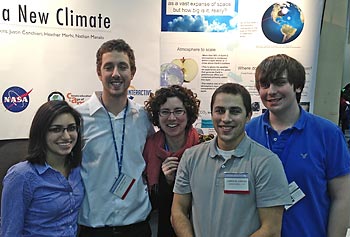Students Showcase our Interactive Climate Tools to Enthusiastic Crowds
By
Ellie Johnston
March 15, 2013
At the recent American Association for the Advancement of Science (AAAS) _annual conference in Boston, thousands got the opportunity to see a demonstration of some of our latest tools and some new interactive exercises to help people understand climate change. The exhibit was put together and led by University of Massachusetts Lowell professor Juliette Rooney-Varga and her students as part of the UMass Lowell Climate Change Initiative to showcase how engaging learning about climate change can be. Below the UMass Lowell news office recounts their experience showing off these tools._Kids, Parents Given Introduction to Climate Change Science, Solutions By Edwin L. Aguirre, 03/13/2013
 Students experienced firsthand the important task of communicating climate change to the general public during the “Family Science Days” event held at the American Association for the Advancement of Science (AAAS) annual meeting in Boston in February.
Students experienced firsthand the important task of communicating climate change to the general public during the “Family Science Days” event held at the American Association for the Advancement of Science (AAAS) annual meeting in Boston in February.
“It was a great learning experience — the amount of science we were able to convey to people was awesome,” said biology senior Justin Conchieri. “I believe we really did inform a lot of people and changed a lot of minds. I even think we made people want to reduce their carbon footprint.”
“It was a joy to see our students educating the more than 3,600 attendees about climate change science and solutions,” said biology Assoc. Prof. Juliette Rooney-Varga, who is director of UMass Lowell’s Climate Change Initiative. “They were fantastic!”
Joining Conchieri were fellow biology seniors Cameron Jenkins, Heather Merhi, Nathan Manalo, Chika Iloh and Itoro Inoyo and biology sophomore Jared Nease.
“I was really surprised by the number of people who kept coming to the booth to get more information,” said Conchieri. “It was literally nonstop talking to people and a lot of times there would be a large crowd listening to us.”
Games for a New Climate
The students created an exhibit entitled “Games for a New Climate,” which was packed with interactive sessions that engaged children and parents alike.
“The activities combined simple, hands-on demonstrations with state-of-the-art decision-support computer simulations developed by one of our collaborators, Climate Interactive. The simulations are used by the U.S. Government, the United Nations and others,” said Rooney-Varga.
The activities included:
- CO2 backpacks. Students brought five backpacks loaded with 1, 3, 5, 25 and 105 pounds of weight, and people had to guess which one was equivalent in mass to the average American’s daily carbon dioxide emission. “Kids had fun trying to pick them all up, while parents looked shocked when they found out that it was 105 pounds,” noted Rooney-Varga.
- Carbon Trust Fund. Using Hershey’s Kisses as “money,” the demonstration taught participants that they could actually make a profit by reducing the amount of carbon dioxide they emit.
- Energy-policy game. In this exercise, people were asked to fill out energy policy choices, which were then entered into a powerful simulation tool called En-ROADS to find out if they were able to meet their emission-reduction goals.
“We definitely contributed to giving the public more information about climate change,” said Merhi. “I think — and hope — the kids learned something as well as their parents. I noticed there were many teachers interested in the games and were taking notes to share with their classes. The teachers ranged from kindergarten instructors to college professors.”

